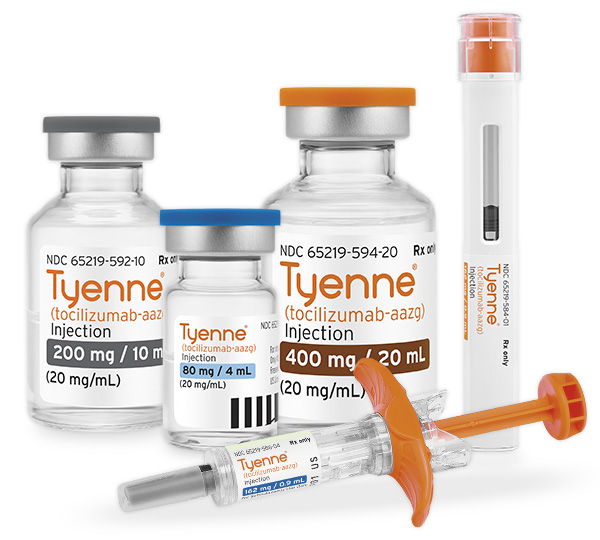Important Safety Information
INDICATIONS
What does TYENNE treat?
TYENNE® (tocilizumab-aazg) is a prescription medicine called an interleukin-6 (IL-6) receptor antagonist. TYENNE is used:
- To treat adults with moderately to severely active rheumatoid arthritis (RA) after at least one other medicine called a disease modifying antirheumatic drug (DMARD) has been used and did not work well
- To treat adults with giant cell arteritis (GCA)
- To treat patients with active polyarticular juvenile idiopathic arthritis (PJIA) 2 years of age and older
- To treat patients with active systemic juvenile idiopathic arthritis (SJIA) 2 years of age and older
It is not known if TYENNE is safe and effective in children with PJIA or SJIA under 2 years of age or in children with conditions other than PJIA or SJIA.
TYENNE can cause serious side effects
Serious Infections
TYENNE changes the way your immune system works. This can make you more likely to get infections or make any current infection worse. Some people have serious infections while taking TYENNE, including tuberculosis (TB), and infections caused by bacteria, fungi, or viruses that can spread throughout the body. Some people have died from these infections. Your healthcare provider should assess you for TB before starting and during treatment with TYENNE.
Before starting TYENNE, tell your healthcare provider if you have:
- an infection, think you may have an infection, are being treated for an infection, or get a lot of infections that return. Symptoms of an infection, with or without a fever, include sweating or chills; shortness of breath; warm, red or painful skin or sores on your body; feeling very tired; muscle aches; blood in phlegm; diarrhea or stomach pain; cough; weight loss; burning when you urinate or urinating more than normal
- any of the following conditions that may give you a higher chance of getting infections: diabetes, HIV, or a weak immune system
- tuberculosis (TB), or have been in close contact with someone with TB
- live or have lived, or have traveled to certain parts of the United States where there is an increased chance of getting fungal infections. These parts include the Ohio and Mississippi River valleys and the Southwest
- hepatitis B or have had hepatitis B
Who should not take TYENNE?
Do not take TYENNE if you are allergic to tocilizumab products, or any of the ingredients in TYENNE.
Be sure to talk to your healthcare provider if you see any signs of these serious side effects:
Tears (perforation) of the Stomach or Intestines
If you have diverticulitis (inflammation in parts of the large intestine), talk to your healthcare provider before taking TYENNE. Some people taking TYENNE may develop a hole in the wall of their stomach or intestines (also known as a perforation). This happens most often in people who also take nonsteroidal anti-inflammatory drugs (NSAIDs), corticosteroids, or methotrexate.
Tell your healthcare provider right away if you see any of these side effects: fever, stomach-area pain that does not go away, or if you see a change in your bowel habits.
Liver problems (Hepatotoxicity)
Some people have experienced serious life-threatening liver problems, which required liver transplant or led to death. Your healthcare provider may tell you to stop taking TYENNE if you develop new or worsening liver problems during treatment with TYENNE. Tell your healthcare provider right away if you have any of the following symptoms:
- feeling tired (fatigue)
- lack of appetite for several days or longer (anorexia)
- yellowing of your skin or the whites of your eyes (jaundice)
- abdominal swelling and pain on the right side of the stomach-area
- light colored stools
- weakness
- nausea and vomiting
- confusion
- dark “tea-colored” urine
Changes in Blood Test Results
Your healthcare provider should do blood tests before you start receiving TYENNE. If you have rheumatoid arthritis (RA) or giant cell arteritis (GCA), your healthcare provider should do blood tests 4 to 8 weeks after you start receiving TYENNE for the first 6 months and then every 3 months after that. If you have polyarticular juvenile idiopathic arthritis (PJIA) you will have blood tests done every 4 to 8 weeks during treatment. If you have systemic juvenile idiopathic arthritis (SJIA) you will have blood tests done every 2 to 4 weeks during treatment. These blood tests are to check for the following side effects of TYENNE:
- Low neutrophil count: neutrophils are white blood cells that help the body fight infection
- Low platelet count: platelets are blood cells that help with clotting, which stops bleeding
- Increase in liver function test levels
- Increase in blood cholesterol levels: your cholesterol levels should be checked 4 to 8 weeks after you start receiving TYENNE.
Your healthcare provider will determine how often you will have follow-up blood tests. Make sure you get all your follow-up blood tests done as ordered by your healthcare provider.
You should not receive TYENNE if your neutrophil and platelet counts are too low or your liver function test levels are too high. Changes in blood test results may cause your healthcare provider to stop your TYENNE treatment for a time or change your dose.
Cancer
TYENNE may increase your risk of certain cancers by changing the way your immune system works.
Hepatitis B Infection
If you have or are a carrier of the hepatitis B virus (a virus that affects the liver), the virus may become active while you use TYENNE. Your healthcare provider may do blood tests before you start treatment with TYENNE and while you are using TYENNE. Tell your healthcare provider if you have any signs of these symptoms:
- feel very tired
- skin or eyes look yellow
- little or no appetite
- vomiting
- clay-colored bowel movements
- fevers
- chills
- stomach discomfort
- muscle aches
- dark urine
- skin rash
Serious Allergic Reactions Serious allergic reactions, including death, can happen with TYENNE. These reactions can happen with any infusion or injection of TYENNE, even if they did not occur with an earlier infusion or injection. Tell your healthcare provider before your next dose if you had hives, rash or flushing after your injection.
Contact 911 immediately, as well as your healthcare provider, if you experience any of these reactions:
- shortness of breath or trouble breathing
- swelling of the lips, tongue, or face
- chest pain
- feeling dizzy or faint
- moderate or severe abdominal pain or vomiting
Nervous System Problems
While rare, Multiple Sclerosis has been diagnosed in people who take TYENNE. It is not known what effect TYENNE may have on some nervous system disorders.
What should I tell my healthcare provider before receiving TYENNE?
TYENNE may not be right for you. Before receiving TYENNE, tell your healthcare provider if you:
- have an infection
- have liver problems
- have any stomach-area (abdominal) pain or been diagnosed with diverticulitis or ulcers in your stomach or intestines
- have had a reaction to tocilizumab products or any of the ingredients in TYENNE before
- have or had a condition that affects your nervous system, such as multiple sclerosis
- have recently received or are scheduled to receive a vaccine
- plan to have surgery or a medical procedure
- have any other medical conditions
- plan to become pregnant or are pregnant. It is not known if TYENNE will harm your unborn baby.
- plan to breast-feed or are breast-feeding. You and your healthcare provider should decide if you will take TYENNE or breast-feed. You should not do both.
- are taking any medications, including prescription and nonprescription medicines, vitamins, and herbal supplements.
The most common side effects of TYENNE include:
- upper respiratory tract infections (common cold, sinus infections)
- headache
- increased blood pressure (hypertension)
- injection site reactions
TYENNE & Pregnancy
Tell your healthcare provider if you are planning to become pregnant, are pregnant, plan to breast-feed, or are breast-feeding. You and your healthcare provider should decide if you will take TYENNE or breast-feed. You should not do both.
Tell your healthcare provider if you have any side effects. You may report side effects to the FDA at 1-800-FDA-1088. You may also report side effects to Fresenius Kabi at 1-800-551-7176.
Please see full Prescribing Information and the Medication Guide, including Serious Side Effects, for more Important Safety Information.

